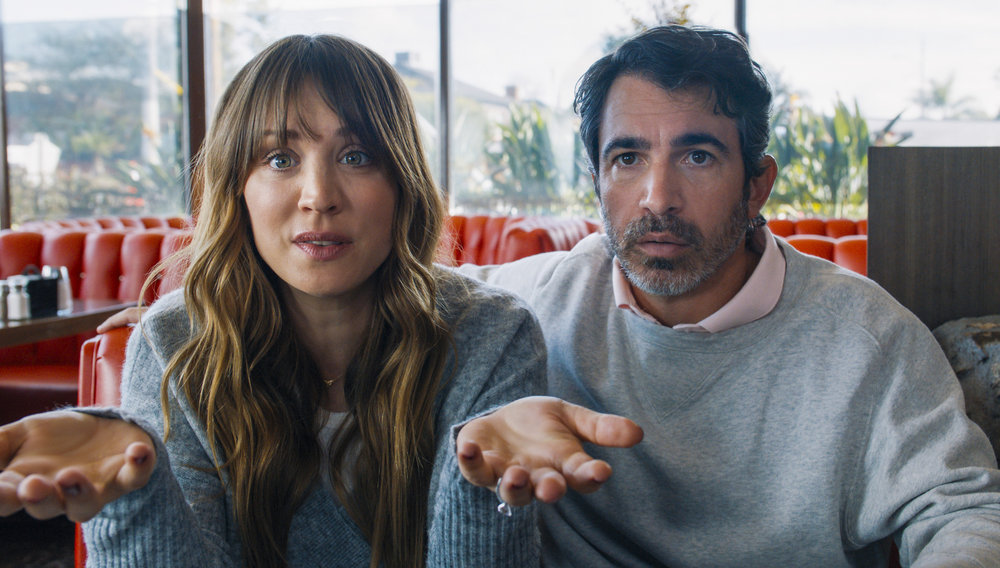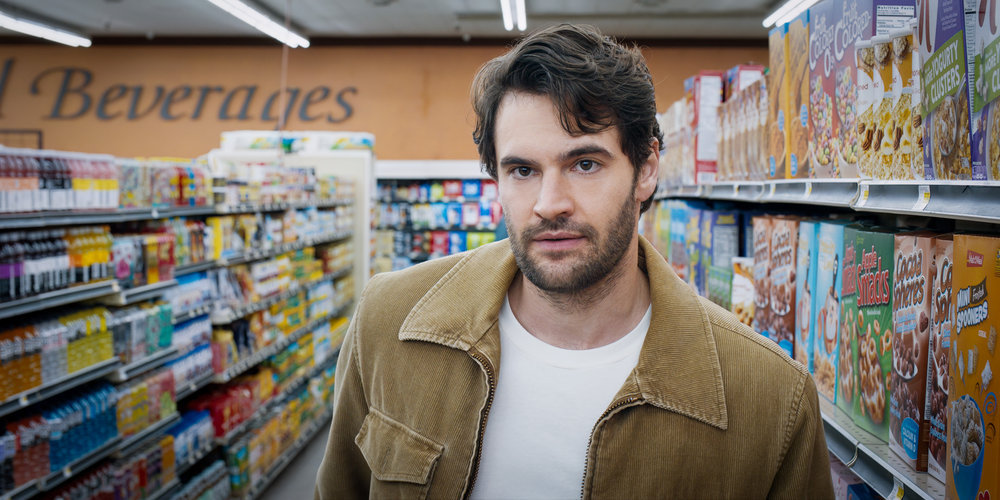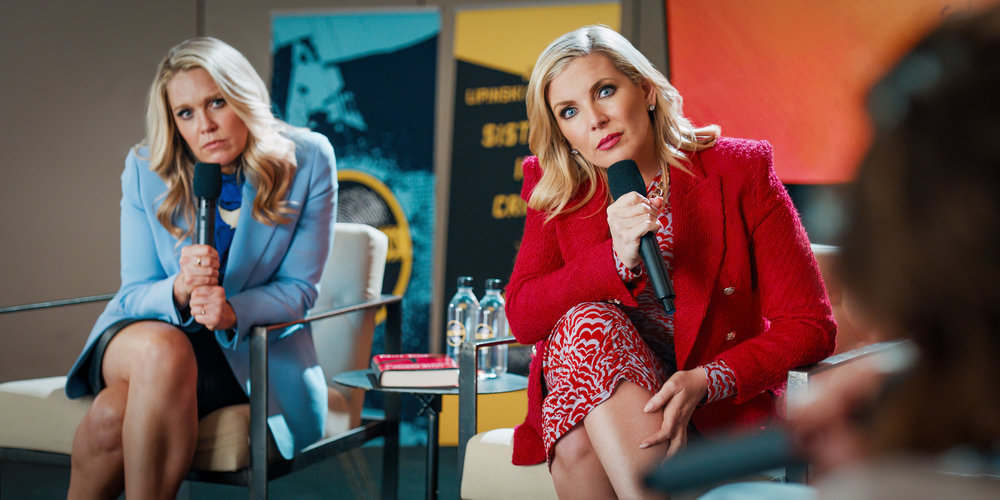
Nearly a decade after The Jinx and the debut of Serial, true crime is no longer a trend. It’s an institution—a genre as elemental within the entertainment industry as comedy or horror, and one whose conventions have saturated pop culture. The “citizen detectives” who populate online message boards are themselves characters on shows like Yellowjackets and Veronica Mars; from Truth Be Told to 2018’s Halloween, podcasters are always poking around fictional crime scenes. It’s been years since we passed the point of too much true crime. Now we even have too much true-crime parody: American Vandal, Only Murders in the Building, Trial & Error, B.J. Novak’s film Vengeance, the Onion’s A Very Fatal Murder podcast, and so on.
Peacock’s Based on a True Story, whose eight-episode first season drops on June 8, is another to add to the pile. A half-hour comedy thriller apparently designed for fans of tongue-in-cheek, female-focused crime romps like Dead to Me, Good Girls, and You, the series casts Kaley Cuoco (who mastered this subgenre in The Flight Attendant) and Chris Messina as a couple who try to reinvigorate their flagging marriage by, what else, making a true crime podcast. If you’re looking for a breezy summer binge, it makes a passable substitute for any of the aforementioned shows. But the writing is blander, the characters thinner, the plot too reliant on viewers’ willingness to suspend disbelief. And the true-crime satire is disappointingly timid.

As in Only Murders, the story originates with crime fanatics for whom murder content serves as a distraction from their quotidian desperation. Heavily pregnant with a baby she hopes will save her marriage, Ava Bartlett (Cuoco) is a real estate agent whose Selling Sunset dreams have given way to a (rarely) selling-apartments reality. She and her girlfriends—all of whom are having affairs—meet regularly to guzzle wine and dissect serial-killer media. Ava’s husband Nathan (Messina) was once a tennis champ, but an injury relegated him, years ago, to the role of onsite pro at a country club. Now he’s being demoted in favor of a younger, more popular colleague. Ava’s kid sister Tory (Liana Liberato), who lives with the couple, loves to flaunt her carefree hookups. Their home on L.A.’s Westside is badly in need of repairs they can’t afford.
The backdrop is, in other words, standard middle-class, early-middle-age dissatisfaction. But it’s the crumbling house that catalyzes the Bartletts’ escape from their stultifying routine. A handsome, conscientious new plumber (Tom Bateman) walks into their lives—and, motivated by a lead in the case of a hometown psycho killer known as the Westside Ripper, the trio hatch a plan to make their own true-crime podcast together. The project will test their courage and commitment to one another. It will also take them on a wild journey through the business of true crime, with its morbid sensibilities and fraught ethics around the monetization of human misery.

True Story creator Craig Rosenberg (The Boys) paints a convincing portrait of a bizarre industry whose widespread normalization can be pretty disconcerting. The show’s murder buffs are constantly comparing notes on their “favorite” serial killers. We meet a famous sister act who insist, while cashing eight-figure checks, that their lurid podcast is all about helping victims. Creators in multiple mediums throw elbows in a race to tell the same hot story. (One TV writer complains that “Ryan Murphy rewrote me and got sole credit.”) “The Westside Ripper? He’s putting my son through college,” says a guy selling homemade merch at CrimeCon.
The casual juxtaposition of real rape and murder with entertainment and leisure is, the show correctly points out, objectively creepy. But True Story fails to add depth to a critique that’s been made dozens of times by now, in more concise formats ranging from op-eds by real survivors of violent crimes to comedy sketches (see: SNL’s “Murder Show” jam). What it does to hold our attention, instead, is craft a series of increasingly over-the-top twists—too many of which turn out to be, annoyingly, representations of characters’ fantasies or dreams. Scenes of cartoonish, slasher-movie violence abound. As in Dead to Me, every episode ends on a cliffhanger.

Unlike that show, however, the characters and conflicts rarely feel specific enough to ground a plot that keeps hurtling forward in absurd directions. At every moment when I should, presumably, have been pondering whether the Bartletts were crossing a moral line, the answer was so obvious—of course they are—that I instead found myself wondering: Would any human being not covered by the insanity defense actually make choices this horrifying?
Cuoco and Messina, both beloved sitcom veterans, were endearing enough to keep me from hating their unhinged characters; her flustered charm complements his running-on-empty peevishness. Bateman effectively mixes up the show’s energy, importing lupine intensity from past roles in projects like Netflix’s bonkers domestic thriller Behind Her Eyes. Priscilla Quintana (Good Trouble) and Aaron Staton (Mad Men’s Ken Cosgrove) inject deranged energy as an ostenatious rich couple whose open marriage is causing friction. While these performances might propel you through eight short episodes, they can’t make seemingly slapped-together scripts cohere. True Story is ultimately unsatisfying—in part because the season ends so abruptly, but mostly because it has so little to say about the genre it’s supposedly critiquing.
Maybe Rosenberg and Peacock, whose library is as rich in true crime as that of any streaming service, made a conscious choice to avoid alienating a valuable audience. Or maybe they, like the Westside Ripper merch guy, are just following a lucrative trend with the assumption that the subject matter will sell itself. Either way, True Story squanders what could’ve been a killer satire.
More Must-Reads from TIME
- Cybersecurity Experts Are Sounding the Alarm on DOGE
- Meet the 2025 Women of the Year
- The Harsh Truth About Disability Inclusion
- Why Do More Young Adults Have Cancer?
- Colman Domingo Leads With Radical Love
- How to Get Better at Doing Things Alone
- Michelle Zauner Stares Down the Darkness
Contact us at letters@time.com